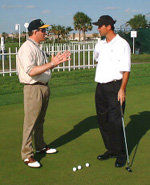
How to be a Disciplined Thinker
Golf is a mental game, a mental battle.
Your thoughts can be bigger obstacles than the course itself, which is why it’s so important to implement positive thinking.
So many thoughts can mentally interfere with your play, “I have never won a tournament,” “I can’t sink a putt today,” “I’m too far behind to make a run up the leader board,” “I might as well give up today,” “My game keeps getting worse, I should quit,”…
Thoughts flood your mind throughout a round of golf and there is nothing you can do to stop thinking. That’s right, negative thoughts will enter your head… It’s normal… It’s a part of golf… It’s a part of life.
In terms of thinking, there is a huge misconception… Positive thinking is the absence of negative thoughts. That is an impossible, unrealistic expectation.
When you double-bogey, your mind will not be only filled with warm, fuzzy, positive thoughts.
Golfers that have this unrealistic expectation in terms of positive thinking often feel they failed when negative thoughts enter their head.
Let’s re-conceptualize positive thinking… Positive thinking is really a matter of three things.
- You have the capability to shape your thoughts… “I’m going to try my best this round.”
- You can re-frame your thoughts… “I may have double-bogeyed the 13th hole but the 14th is a new opportunity.”
- You have the ability to choose the thoughts you focus on. “I hit my chip shot way too hard. My strategy for this shot is to hit it four inches to the right of the cup so the ball breaks to the hole.”
These three characteristics are the essence of your mindset.
The biggest success story in golf this year, and possibly ever, is Tiger Woods winning the 2019 Masters which has everything to do with his ability to direct his thinking.
The litany of potential negative thoughts that could have derailed Woods was lengthy:
- A Major tournament with the biggest viewing audience
- Being 43 years old and older than most of the field
- Past injuries (back, Achilles and knee)
- Well-chronicled past personal issues
- Eleven years since his last Major victory
- Being 2-strokes behind starting the final round
- His family watching in the gallery
- Back-to-back bogeys on holes No. 4 and No. 5 on the last round
- Another bogey on the 10th hole
- Being tied for the lead on the 12th hole for the first time
- 6-7 golfers being in contention after the 13th hole
- Taking the lead on the 15th hole
- The pressure of leading by 2-strokes on the final hole of round 4
- The potential of being one of the greatest career comeback stories in golf
How was Woods able to control his thoughts despite all these potential distractions?
Woods kept reminding himself to stay patient and “handle his own business” instead of worry about what other guys were doing:
WOODS: “I was very disciplined in what I was doing out there. Even when yesterday guys were shooting 64 left and right, I was just kind of going around, just handle your business, work your way up the board. We’ve still got a lot of golf, a lot of holes to play, and just make sure that I’m there in the end…”
“There [were] so many different things that can happen on the back nine on Sunday. We all know that, and it played itself out again. There were so many different scenarios that could have happened after 12. It could have gone so many different ways, and I just kept saying, just keep hanging in there until the last couple holes and we’ll see where we are. Just keep hanging in there.”
Woods was focused on what to do and was able stick to his game plan, even though there were many potential thoughts that could have unglued his attention for the task at hand.
Being disciplined starts with being disciplined in your thoughts, positive thoughts, and focusing on thoughts that are productive and contribute to playing your best.
Being Disciplined in your Thinking:
Just like Woods, direct your attention to thoughts that help your performance by reminding yourself to take care of your game rather than worry about all the things that might happen.
One strategy for being disciplined in your thinking is to consciously cue yourself about what to do, “How are you going to hit the tee shot? What is your best strategy for the hole?”
Having an internal conversation with yourself keeps distracting thoughts at bay.
Related Golf Psychology Articles
- Subscribe to The Golf Psychology Podcast on iTunes
- Subscribe to The Golf Psychology Podcast on Spotify
Golf Mental Coaching Programs

All golf psychology programs include the Golfer’s Mental Aptitude Assessment (GMAP), a custom Mental Game Plan, weekly coaching sessions, unlimited email correspondence, and The Golfer’s Mental Edge 2.0 workbook program.
One-on-one mental coaching is the fastest and most effective method to improve your mental game, boost your performance, and make lasting changes!
We have unique mental coaching programs, customized for you. Please contact us with any questions your have about our programs. Provide your name, email, and role below:
Or Call us today at 888-742-7225 | Mental Game Success Stories